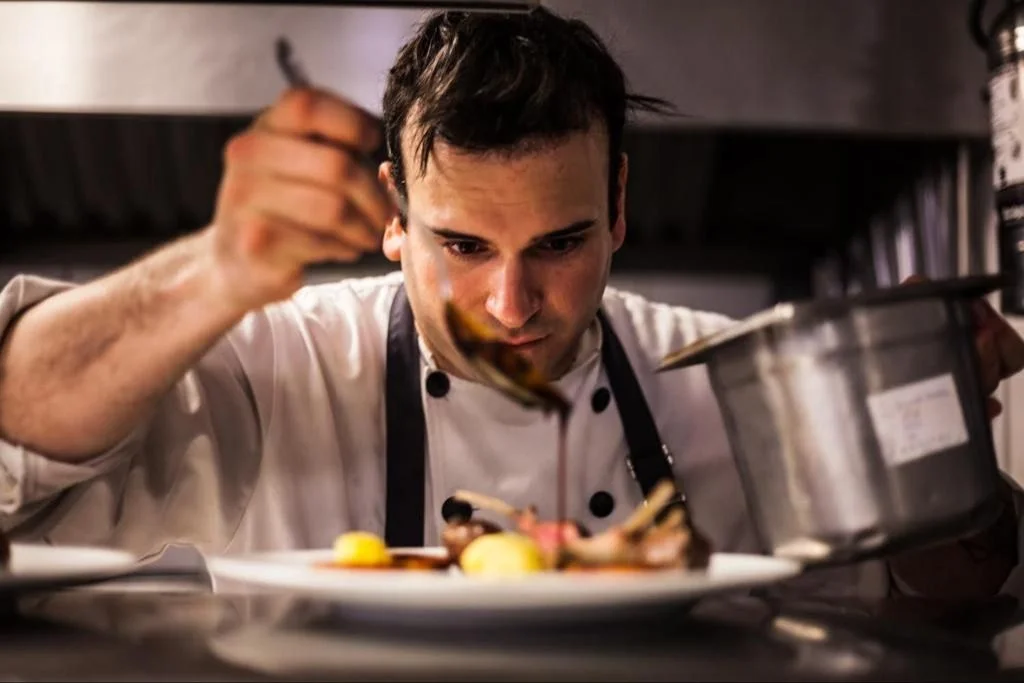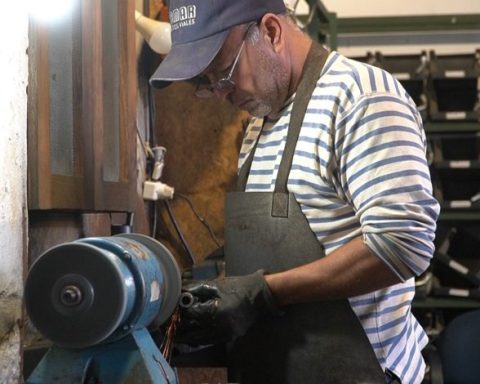Alfonso, Agustin and Adrian They have more in common than the first letter of their names. The three They are Uruguayan and migrated to Europe to work in gastronomyafter having reached its ceiling in the country of origin.
The three agree: in Uruguay there is “a ceiling” that they broke when they decided to settle abroad.
“If you got to a place that was good, there wasn’t much else to see, you couldn’t follow that growth if you were hungry for more. In Europe there is a culture of eating out, a more competitive market, and you don’t have a roof. You can progress, learn and change, and look for the gastronomic branch that you want. The limitations in Uruguay are bigger”, commented Alfonso Juan Delgado, to explain that idea.
Michelin star
Alfonso is 33 years old, and since he was 18 he has been working in gastronomy. He studied at the Hotel Tourism Institute of Uruguay and his last job in Uruguay was at the Sofitel Montevideo hotel, in Carrasco.
In 2018 he decided to go to Spain. As she told Coffee & Businessmany Uruguayans have that country as their first option to migrate and work in the kitchen, because of the language, because there are many compatriots in the country, there are job opportunities, and because “San Sebastián is the gastronomic cradle of the world, the place that has most Michelin stars per capita in the world.
When he arrived in that country, Alfonso got an internship to work at Akelarre, a restaurant with three Michelin stars. There she cooked for three years. The work in a restaurant of these characteristics is intense, sessions can last up to 16 hourshe said, but you learn a lot.
After a time there he went to Copenhagen, Denmark, to work in a restaurant called No mom. She cooked there for a period and then switched “for something a little quieter.” He is now a chef in a five-star hotel. And although he stressed that the work is not as heavy a load as that of a Michelin-starred restaurant, the days are between 11 and 12 hours a day.
As he stressed, it is important to note that high-demand restaurants demand more working hoursbut there are also those who work eight-hour days, five days a week.

Alfonso currently works in Denmark.
Save US$1,000 a month
In Denmark, a full-time contract is capped at 148 hours per month, each hour is paid 187 Danish crowns, which is equivalent to US$27. A salary of that type would be US$3,996 per month. Alfonso explained that, depending on each person’s lifestyle and how they manage their expenses, it is possible to save US$ 1,000 a monthsince in that country the cost of living is high, and the percentage of taxes too.
Who also highlights the ability to save is Adrián Kirchnitz, a 24-year-old from Solymar who learned cooking at the UTU and left Uruguay to go to Switzerland and today, in addition to working abroad, explains on his social networks how the process is to migrate, work and save, on his Instagram, YouTube and TikTok account @viajandoconadrian.
He has had a taste for cooking since he went to high school, and when he traveled to Europe for the first time, together with the Uruguayan Center for Foreign Languages (CLE), he returned “fascinated” and eager to fly from his native country. It was so that in 2017, after resigning from the sushi restaurant where he worked, he went to live in Switzerland with a friend.
“I turned 19 and I took the plane without knowing when I was coming back”, counted. His first job abroad was in a supermarket in the Swiss Alps, a task that allowed him to practice the language, by being in contact with people, something that was positive, because some time later, when he entered Swiss gastronomy, that was one of the challenges he had to face.
One of the things that first caught his attention about that country when he arrived was the salaries. He was told about a person who had started working in a fast food restaurant and the salary was 3,000 francs, equivalent to $120,000. At first he couldn’t believe it, but when he started working in a restaurant, his salary was higher, he said. “What I earned in four days was my salary in Uruguay”, he calculated. Still, the cost of living is high, she said.

Adrián has traveled to several countries and is currently cooking in Switzerland.
Switzerland cheaper than Uruguay
In his social networks, Adrián Kirchnitz reports on his life as a nomadic worker, and talks about how expensive it is to live abroad, but comparing prices with Uruguay. “I am surprised that in the supermarket in the middle of the Swiss mountains everyday things like milk or noodles are as cheap as or cheaper than in Uruguay”shared.
He worked in a restaurant that was on a mountain. She started as a kitchen assistant and learned to make different dishes. She spent a season and decided to go to Spain.
“I started traveling to grow in different ways. There is nothing more beautiful than cooking with different chefs from around the world and learning with them”, she highlighted.
While working in the supermarket in Switzerland, he met a client who was Spanish, owner of a restaurant in Barcelona. Years later he contacted him, traveled to that city and began working in a “quality fast food” service for universities. He was there for seven months, with a monthly salary of 1,600 euros. “I had 900 euros left over, we are talking about $45,000 a month, while in Uruguay, in a kitchen you can earn $35,000”rescued.
Chefs’ desire to undertake
In addition to Switzerland and Spain, Adrián got to know New Zealand while working and stressed that it is a good place to undertake, since in other countries, such as Europeans, undertaking a gastronomic project requires very large investments.
Now he returned to Switzerland, where he will stay for a year working in a restaurant (the maximum time he has spent in the same establishment), this is because the restaurantin which she cooks not only for diners but also for a service from a school in the mountains, is run by a chef who worked at a Michelin starred restaurant and “it blows your mind, because he changes the dishes every two weeks, and that’s good,” he said.
Agustín Ibarra agreed: Starting a business in Europe is expensive. This chef, originally from Florida, also studied at UTU. In 2012 he traveled to Rio de Janeiro for the first time to work for a while, and when he returned he got a job at the Sofitel hotel in Montevideo, where he worked for several years.
“I had the feeling that there was a point where there was a limitation between the desire to continue growing and how to do it,” he said, and that is how he decided to emigrate.
In Spain, he had different jobs in the kitchen until he got an internship at the Cocina Hermanos Torres restaurant, which has three Michelin stars.
win in culture
In his first European job, Ibarra earned 1,600 euros “and at the touch he would convert it to pesos and think: ‘in my life I am going to win this in Uruguay.’ It was a lot. In Uruguay he earned 500 euros and it was a salary that was fine ”.
Although the salary was very good, “life is much more expensive,” he said. Now he has moved from Barcelona to Mallorca to join a gastronomic venture run by some Swedish investors in which there are five Uruguayans in the kitchen, and looking for a place to rent, he discovered that the minimum income is 800 euros.
“If you count the rent and the expenses, you can have 1,500 in expenses, but there is saving capacity”, it all depends on whether you can divide the expenses or live alone and have a lower rent, also from the area of the country in which you live, he commented .
Furthermore, unlike Uruguay, seasons can be up to seven monthsTherefore, for those who travel to work seasonally with the aim of saving as much as possible, it is a good option.

Agustín migrated to Spain to cook.
When he first arrived in Spain, Ibarra had to go through several jobs, because the basic need was to find a job. Now, after several years of effort, he is looking for the conditions he wants, better hours, good salary and a place aligned with his way of thinking, in life and gastronomy.
“Uruguayan cuisine is not the same as European cuisine, times are not the same, it is not worse or better, it is different” commented. The requirement of European haute cuisine was something that she liked to live, as an experience, but that she did not choose as a lifestyle.
“There are very good chefs in Uruguay and very good products, but when I left there were not so many. Here there are more products and as there is more demand there are many more possibilities and not only in the kitchen, but because you interact with people from all over the world, you get to know flavors, spices and foods and that opens up the paradigm for you to try other things. It is winning in culture, ”she concluded.















